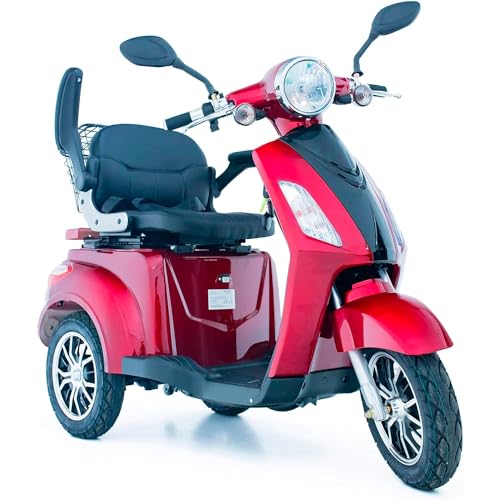Scooter Green Power
Scooters are fun easy, safe and secure way to travel. They are also eco friendly. It's important that you do your research prior buying one.
Despite being carbon-free on the surface scooters do have hidden costs. The production and mining of the batteries that power electric scooters produces significant emissions. simply click the up coming document of shipping scooters from charging stations to the point where riders take them is added.
Battery Life
Battery is one of the most vital components of any scooter. It has a huge impact on the eco-friendliness of your scooter. This is because when the battery fails it releases harmful substances into the air, which can have a major ecological and economic impact.
Electric scooters are very energy efficient, consuming only a fraction of the electricity that cars do when driving the same distance. This can help to reduce air pollution, climate change and traffic congestion. They still produce a small amount when charging. If the energy is derived from renewable sources, this could make e-scooters even more sustainable.
Many scooters also have interchangeable batteries, which can be used to recharge other scooters within a fleet. This reduces the necessity for companies to transport the batteries to recharge. Some companies are also testing with hyper local energy production, enabling the grid to utilize the power stored in batteries to balance demand and supply.
If you are planning to make use of your scooter for longer trips, then consider purchasing a larger capacity battery, or a spare battery that can be swapped. You will be able to travel for longer distances without having to recharge the battery so often. This is especially important if you are in an area that experiences harsh weather conditions. It is also a good idea to recharge the battery prior to placing it in storage for weeks or months at one time. Inadequately doing this could cause the battery to stop being able to hold a charge when you need it again which could be frustrating and potentially dangerous.
Overall, electric scooters have a significantly lower environmental impact than cars and other forms of transport. They emit fewer greenhouse gasses that contribute to global warming and they require less raw materials to manufacture. They can be powered by clean electricity, which can drastically reduce their carbon footprint. However, it is crucial to think about the entire cycle of a scooter when assessing its sustainability. This includes the process of manufacturing, the energy used to charge it, and its disposal.
Design
The design of electric scooters could have a significant impact on their green power ratings. Scooters that have regenerative brake systems, for instance they convert energy that would be lost otherwise into extra battery life, which allows them to travel farther on each charge. A lot of scooters are designed for shorter distances, thus reducing the number of trips to the vehicle required. And, unlike traditional vehicles, scooters emit no carbon dioxide during use.
It is important to take into account the environmental impact of an electric scooter's entire life cycle. This includes the extraction of raw materials, the manufacturing and disposal at the end of its life. The production of lithium-ion batteries can be energy-intensive, and could cause habitat destruction as well as water and soil pollution and greenhouse gas emissions. The mining and transportation raw materials can have a significant effect on the environment.
green power scooter reviews to last is another important issue with scooters. The average scooter only lasts about a month or two on the streets before being discarded. This could mean that scooter companies have to extract more aluminum and engage in more shipping and other resources-intensive activities. Since most scooters are rented, rather than owned by the owner, they must be taken in, and then transported (often in vehicles) to a charging station when their batteries are exhausted.
At the time of end of life disposal, scooters may contain hazardous waste that can pose a threat to public health and the environment. If not recycled properly, the waste can end up in landfills or rivers and pose a risk to people and wildlife.
Scooters are better for the environment in general than conventional vehicles. However, there are still some issues that must be addressed before they can be deemed 100% eco-friendly. If all scooters are constructed of 100% recyclable materials and the electricity that drives them comes from renewable sources, they could be a carbon-free form of transportation.
Maintenance
An electric scooter may be less expensive than a conventional car however, it still requires regular maintenance. The battery pack is the most important component to think about. It should be charged regularly and replaced at the end of its lifespan. The speed controller is a factor as well. If the speed controller is not functioning properly, it will affect the performance of the scooter.

When the scooter shuts off or cuts out while riding, this usually indicates a problem with the battery pack. A faulty fuse or charger for the battery could also be the cause. Check the lights on the charger to ensure they're green (charging) and not red (off). Even if you don't use the scooter, it is an ideal practice to charge it each time it is stored.
Another common problem is a defective normally closed brake lever switch. To check for this, disconnect the wire from the switch for the brake lever and bridge the terminals together within the controller's connector the wire is unplugged from. If the scooter continues to run in a continuous manner, the switch may be defective.
Scooter services allow people to drive cars and trucks all day long, and bring back electric scooters that have run out of juice. This helps them keep their fleet in good order. It also allows them to charge the batteries before the next ride. Many consumers do not have this luxury, and must replace their scooters whenever they run out of power.
